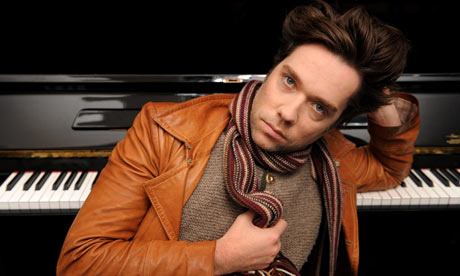

Could it be? Rufus Wainwright -- singer, songwriter, son of legendary folk singers Loudon Wainwright III and Kate McGarrigle as well as brother to Martha Wainwright and Lucy Wainwright Roche -- may be New York City Opera’s (i.e. City Opera or "the people's opera") saving grace?
For City Opera, the past two years have witnessed thorough attempts at revitalization. There was a $107 million plan to refurbish the company's home at Lincoln Center -- the David H. Koch theater -- along with faulty managing of funds, poor repertoire choices, and a dangerously low audience attendance rate. Optimal budget solutions have been proposed, agreed on, attempted at meeting, and sadly, have garnered no success. Artist management authorities, such as Gerard Mortier -- the former general director of Opéra National de Paris and director of numerous European music festivals (la Monnaie (Brussels), the Salzburg Festival, and the German Ruhr Triennale arts festival) -- have endeavored to save "the people's opera." However, even the brilliance of Mortier's budget-torial planning did not save the company from making its decision to leave Lincoln Center which was officially announced a month ago in the NY Times.
A thirty-year plaguing dilemma for the "people's opera," the move is a monumental decision which is arguably advantageous. Being at Lincoln Center exhibits detriments for the company. These include Koch Theater's unflattering acoustics (originally intended to muffle the thumps of dancers' feet in the American Ballet Company who City Opera shares the space with) and the nature of being subordinate to the Met who lives right next door. The Met, after having attained an intense amount of success due to its HD film series as well as surviving in a venue that encompasses the ideal acoustics for opera, leaves no question as to why Anyhony Tommasini claimed the Met as today's "people's opera." For the same price-tag as seeing a City Opera production ($25), you can experience opera in its optimal conditions. (In fact, the Met also offers, a couple hours before a show, tickets at the price of $20.)
That is why, after reading Daniel J. Wakin's article in the June 21, 2010 edition of the NY Times, I was not surprised by his mention of Rufus Wainwright's Prima Donna as being premiered in the US by City Opera. After all, Mr. Wainwright has carved his popularity by concocting an eclectic style which fits everyone’s wallet of genre-istic pleasers. He conveys the soul of a singer sitting alone at the piano, which at times, is interspersed with soft strings, elements of rock (electric guitar and drum set), and a bit of, you know, style. By donning bell-bottomesque, boot-cut jeans with leather boots and a well-addressed haircut, Wainwright fits the societal status-quo of a modern musical icon. His melodies are easy on the ears, and his public image is not too ostentatious to handle (unlike Lady Gaga’s steak costume which garnered the attention she wanted through its provocative nature).
Conversely, Wainwright is altogether easy-to-handle by exhibiting a personae that is cool, calm, and charming.
I can see why audiences young and old favor Wainwright -- he clearly fuses the generation gap between the 70s and today. Take for instance his rendition of Leonard Cohen’s “Hallelujah” which has been covered by a variety of artists since the song’s reception in 1984.
With Rufus on the horizon and a move to a more conventional area of NY over Lincoln Center, such as the East or West Village, City Opera could acquire buoyancy and really return to its title of "the people's opera." A smaller theater would embrace the idea of intimacy which has become ever so trendy and popular. Venues, like (le) Poisson Rouge, offer the audience a chance to experience performers. One can warm-up to the idea of artists as real people by soaking in each of their various viewpoints encased behind pieces on a program. Allowing performers to talk with the audience helps listeners delve further into each artists' sound a little more profoundly than say a larger auditorium because the formalized barrier built between the artist and the audience is broken. So, with this progressive idea in mind, one could say that City Opera is on its way towards reaching the water's surface with the idea of more humble performance space.
Oh, and by the way, here's a little sneak-peek into Wainwright's Prima Donna.
No comments:
Post a Comment